Genre: Strategy Developer: Westwood Studios Publisher: Virgin Games Players: 1 Released: 1994
Dune: The Battle for Arrakis is a translation of the PC game Dune II: The Building of a Dynasty. Yes, that’s the same game that pretty much created the real-time strategy (RTS) genre as we know it (Herzog Zwei doesn’t count, as it’s technically a RTS, but with vastly different gameplay). Command and Conquer, Warcraft, Starcraft, Dark Reign, Total Annihilation, and many others owe their very existences to this game. But how does the Genesis version compare to the PC original, especially one that was designed for use with a mouse? Surprisingly well, exceeding the standards set by the old 1992 version disk version.
The game just takes the basics of the Dune storyline and runs with it. Three houses, the Atredies, Harkonnen, and Ordos compete for the harvesting of a valuable spice. The emperor declares an all-out war against whoever can harvest the most spice. You pick one of the three houses to play as, competing against the others.
In case anyone is unfamiliar with the gameplay, here’s how it goes. You have a very small base and a few units to carry out your duties. You have to expand your base and eventually build a refinery. From there, machines known as harvesters will look for nearby spice, return to the refinery, and give you money. You then use this money to expand your base, build more units, and eventually overcome the enemy base in the area. That’s pretty much it…except for the first two missions (in which you have to obtain a certain amount of spice to proceed), and the overall objective is simply to destroy the enemy.
You first expand your base by putting down bricks to prevent corrosion, then placing your building of choice on top. You are a bit limited in where you can build your base (only on rock, not on sand) but that’s usually not a big problem. First you need a wind trap to provide power… the more you expand, the more wind traps you need. From then, you can build the aforementioned refineries. Each level introduces something new…as you get farther, you can make outposts (that activate the radar in the lower-right corner of the screen), barracks and vehicle factories (for making units), repair facilities (take a guess), star ports (for buying units on the market), spice silos (to store excess cash), and eventually the palace, that lets you use the house’s special power.
Each house is a bit different…the maps change in all of the campaigns, and there are differences in the units. While it isn’t huge at the beginning (the Harkonnen don’t believe in the small, speedy trikes, for instance, but can build heavy troopers), eventually each house gets it’s own really powerful unit to play with. So there’s plenty to see and do in Dune.
The gameplay is fairly simple. To move a unit, simply click on it, and then click on the place where you want it to move. Similarly, to attack, just click the unit you want to do the attacking, then on the target. Building is also fairly easy. Just move over to the construction yard (the heart of your base), choose which building you want to make, and it’s taken care of. It can then be placed when the construction is finished. If you want to build multiple buildings (useful for making many concrete bricks) simply press B. The same method pretty much goes for training soldiers or manufacturing vehicles. There’s also a method for “quick scrolling” the screen by holding down C.
Although most of the game is action, there’s a sufficient amount of strategy too. There’s some resource management, and also some battle tactics. For instance, the best way to take out an enemy base is to make a bunch of units, send them over to take out the defending enemy baddies, all the while making new vehicles. Once all ]the defenders are gone, send in the newer troops to help the old ones destroy the enemy’s construction yard. From there, they can’t rebuild any of their structures, so you can pretty much go on to destroy their vehicle plants or whatever. You can even destroy the enemy harvesters, if you wish to stop their spice income.
I loved the PC Dune II, and there are a fair amount of changes. The interface as a whole has been improved so you no longer have to issue commands with buttons. All of the buildings and units are bigger, making them quite a bit nicer. The music’s entirely different, but many of the speech samples were left out. The PC version had three announcer voices depending on your house, but this Genesis cart only has one (and he doesn’t talk as much.) Instead of game saves in the middle of a battle, you have to use passwords in-between missions. You still can’t group a bunch of units together (you have to send each one in separately). There are other subtle things (construction doesn’t take nearly as long, for example) but on a whole, the Genesis version comes out on top primarily for the better interface and larger graphics.
There are a few problems though. The AI isn’t very intelligent all of time, so sometimes your units will stand by blindly as three enemy tanks are crushing one of your vehicles. Plus, in order to reach certain targets, sometimes your vehicles will attempt to fire THROUGH a building in its path. Needless to say, this doesn’t work, and if you’re not paying attention, you could end up accidentally destroying one of your own buildings. Moreover, slowdown can get pretty nasty as units accumulate on the screen…this game really taxes that Genesis CPU.
The visuals are just fine…they’re of a good size, so you won’t lose them. Most of the scenery is just desert and rock, and while it gets a bit old after a while, it isn’t really that bad. There are really only five music tracks that play during the game, but they’re all excellent. I would’ve liked the old PC tunes mixed in, but oh well. And the voices that were kept in sound great.
Overall, I’m happy to call Dune: The Battle for Arrakis one of my favorite Genesis cartridges. It’s really easy to get sucked in the base building and the battles… it’s very involving and requires a bit of thinking, but not ever to the point that it’ll hurt your brain. A superb action/strategy title overall!


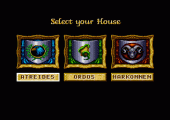
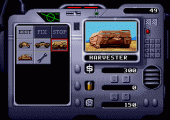
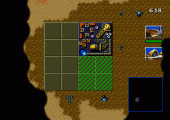
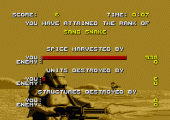
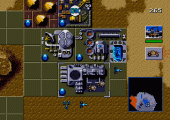
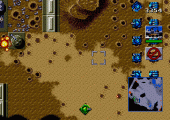
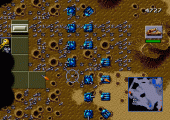
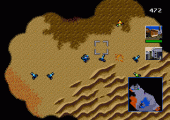
Recent Comments